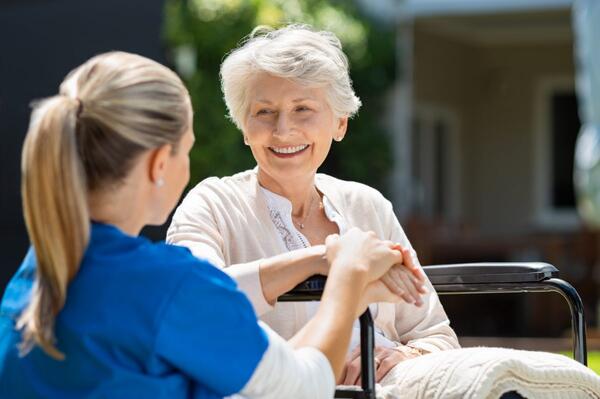
The Unsung Healthcare Roles Supporting Seniors Every Day
Healthcare is a versatile field and consists of many niches catered toward specific needs. This is part of what draws so many young, compassionate people toward healthcare. Many of these people specifically want to help seniors, and they have many options.
That’s because no blanket career path encompasses all aspects of senior health. Instead, senior care is made up of many small niches, such as home care and physical therapy. Seniors have unique health needs, which require specialized care.
Follow along as we highlight some essential healthcare roles focused on supporting seniors every day.
Countless Healthcare Professionals Care for Senior Citizens
Everyone, from infants to senior citizens, relies on healthcare professionals. That said, senior-focused healthcare professionals don’t get as much attention as pediatricians and general practitioners. Of course, things change as people age and suddenly understand the need for healthcare tailored to older adults.
There is no single specialization that handles all aspects of senior health. Older adults rely on healthcare support from many types of practitioners, including:
Certified Hospice and Palliative Nurse
Many senior citizens wind up in hospice care, where they rely on Certified Hospice and Palliative Nurses (CHPNs). Hospice nurses selflessly care for seniors struggling with terminal illnesses, and they have many responsibilities. Naturally, they handle the technical aspects of care, such as administering medications and treating symptoms.
However, hospice nurses must also offer emotional support and connect with their patients on a deeper level. This is a difficult job for many reasons, as working in hospice care is physically and emotionally demanding. In many cases, hospice nurses help their patients’ families just as much as they help their patients.
For example, hospice nurses often update their patients’ families and explain certain symptoms, treatments, and changes. This job requires a great deal of empathy and patience. Many people overlook hospice nurses until they see a loved one go through hospice care.
Home Health Aide
Some people may hear “home health aide” and think it refers to hospice nurses. While there are some similarities, home health aides care for people recovering from serious injuries and illnesses. They don’t care for terminally ill people like hospice nurses do.
Home health aides help people recover from illnesses and injuries while also helping them manage daily responsibilities. They help with everything from grooming and bathing to medical care and exercises. You must be certified as a Certified Nursing Assistant (CNA) to work as a home health aide in many states.
Home health aides help people of all ages, but they primarily help senior citizens. This unsung role is often overlooked, but their help is invaluable.
Speech-Language Pathologists
Speech-language pathologists don’t solely serve seniors, but many of them support seniors every day. Many senior citizens struggle with speech disorders, communication struggles, and dysphagia. Dysphagia, or trouble swallowing, is common among seniors, and SLPs are among the few people qualified to help them.
Whether you have a master’s in speech-language pathology or enter the workforce with a bachelor’s degree, your contributions are invaluable. SLPs can help seniors maintain control over their lives and overcome speech challenges. In doing so, SLPs help their patients stay connected with their loved ones.
Helping seniors who struggle to swallow can even save lives. SLPs develop exercises and create treatment plans tailored to each person they help. While SLPs are valued, their contributions to senior citizens often get overlooked.
Geriatric Nurse Practitioner
Nurse practitioners don’t always get as much credit as physicians do, despite serving similar roles. This is compounded even more when talking about geriatric nurse practitioners. Geriatric nurse practitioners monitor older adults’ health, create treatment plans, and prescribe medications.
Every day, geriatric nurse practitioners help seniors stay healthy and overcome illnesses and health problems. Older adults should visit geriatric nurse practitioners or geriatricians once yearly. They specialize in caring for older adults, which comes with many nuances that require specialization.
Illness prevention is a big part of what they do as well, and that’s a big concern for many older adults. They can point you in the right direction regarding diet, exercise, vices, and habits.
Geriatric Physical Therapist
Being a senior citizen doesn’t mean you’re resigned to being immobile and unathletic. However, seniors sometimes take longer to bounce back from injuries, surgeries, and age-related physical changes. In that case, many seniors rely on geriatric physical therapists to help them enjoy a better quality of life.
Many seniors deal with osteoporosis, arthritis, nerve pain, and joint pain. Geriatric physical therapists teach seniors exercises to help them regain mobility and become more active. They can also help seniors recover and regain mobility after serious health incidents, like strokes.
By helping seniors stay active, they can significantly improve the quality of their lives. While they remain unsung, countless people who are young today will eventually rely on geriatric physical therapists.
Senior Care is as Important as Any Other Part of Healthcare
Whether you want to become a pharmacist or a geriatrician, you are driven by compassion. Compassion is at the root of all healthcare jobs, and some of them are focused on senior health. Unfortunately, many healthcare roles centered on senior health don’t get enough attention.
That said, hospice nurses, home health aides, and geriatric nurse practitioners have likely helped some of your loved ones. Those who specialize in senior health can significantly improve older adults’ lives. Whether you want to be a physical therapist or a geriatrician, you can make a big difference through meaningful work.